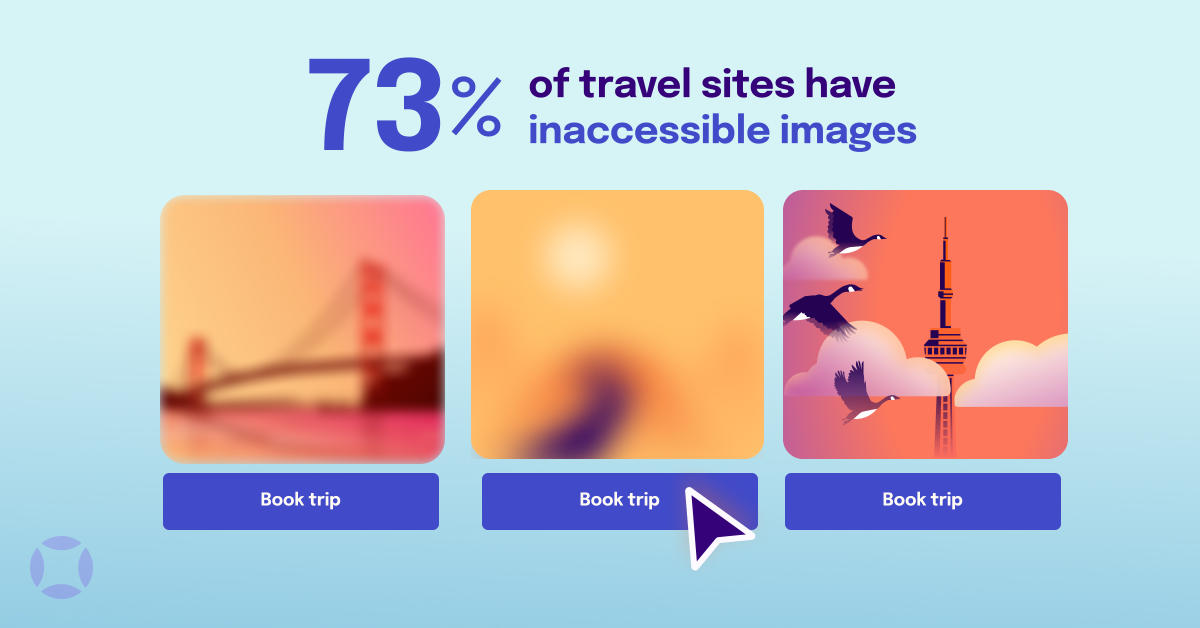As the warmer months approach, travelers everywhere are starting to plan their summer getaways. For most of these eager travelers, and thanks to the many digital conveniences available at the tap of a fingertip, planning and booking adventures has never been easier — from flights to accommodations, attractions to dining, and all the entertainment in between.
Unfortunately for people living with disabilities — the world’s largest minority — booking travel does not offer the same experience that many have come to expect. According to a recent evaluation of nearly 40,000 enterprise websites by digital accessibility company AudioEye, travel sites are failing to deliver inclusive experiences for people with disabilities. Travel sites have some of the highest accessibility failure rates of any industry:
- 40% of travel pages with a form had at least one field that was not labeled, making it difficult for people with visual and cognitive impairments to sign up for an account or upload their personal information
- Testers found an average of 15 accessibility barriers across the pages tested, which included account pages and flight/room pickers — including four consistent barriers that impacted the ability to book rooms and flights
- Links without labels failed to provide critical context, which forced non-sighted users to stop, go back, and read the surrounding text to try and figure out where clicking the link would take them
- 73% of travel pages had at least one product photo or graphic with missing or inadequate alternative text, so people with visual or cognitive disabilities were unable to understand what an image was supposed to illustrate
As travel and tourism companies evaluate their offerings ahead of the peak travel season, it is important to ensure that these digital platforms are accessible to all.

Understanding Accessibility
Simply put, digital accessibility ensures that websites, applications, and online documents are designed and developed so that people with disabilities can perceive, navigate, and interact with the digital world effectively. This includes considerations for those with visual, auditory, physical, speech, cognitive, and neurological disabilities.
The travel industry thrives on the diversity of its customers, and there are many reasons for prioritizing accessibility across digital offerings.
-
Digital accessibility from a business standpoint: Nearly 1.3 billion people globally live with some type of disability, yet only 3% of the internet is accessible to people with disabilities. That’s a costly gap for businesses, especially considering the $13 trillion in spending spending power that the disability community controls.
-
Digital accessibility is the law: There have been a record number of digital accessibility lawsuits in recent years, with travel and hospitality lawsuits also on the rise. Ensuring that web entities conform to accessibility standards like the Web Content Accessibility Guidelines (WCAG) can help organizations protect themselves from the risk of litigation.
-
The moral obligation: Everyone should have the same opportunity to explore the world, regardless of their abilities. The travel experience starts at the digital level, so it’s up to businesses to ensure that the digital experience remains a positive and inclusive one.
Committing to Digital Accessibility
Many companies and individuals are making great strides in overall accessibility offerings. Several leading travel accommodations and booking websites have implemented practices — such as incorporating accessibility filters that allow users to search for listings with specific accessibility features, encouraging hosts to provide detailed information about their property’s accessibility, or offering online filters that include options for people with mobility, vision, or hearing impairments.
There are also many outstanding individuals pioneering change and working to shift the priorities around accessible and inclusive travel experiences for all.
Digital accessibility is not a one-time task, but a journey. In many cases, it takes finding the right partner to ensure that the approaches they are taking help to promote accessibility, usability, and legal compliance.
Here are a few additional things to consider:
- Accessible website design encompasses the layout of your website, as well as all the design elements that are easy to overlook. Ensuring that your layout is clear and uncluttered with consistent navigation, including descriptive alternative text for images, ensuring all functions can be accessed and operated using a keyboard and maintaining sufficient color contrast for readability.
- Clearly labeled booking forms, which encourage ease of use and keep customers on your site, rather than forcing them to leave due to inaccessibility. Offering clear error messages and suggestions for corrections, as well as implementing autocomplete features can help assist users in filling out their forms correctly and efficiently.
- Accessible maps and location information give travelers the idea to truly envision their accommodations before officially booking, so it is important to consider implementing zoom functionality for better navigation comprehension, textual descriptions alongside the maps for those who cannot view them, and alternative map formats for increased accessibility.
- Responsive design ensures your website works seamlessly across various devices and screen sizes. Buttons and links should also be large enough and well-spaced for easy touch navigation.
As the travel industry continues to evolve, so should our practices around digital accessibility. By implementing these considerations, travel booking platforms can create an inclusive environment where everyone can plan their adventures with ease. Whether it's ensuring a visually impaired traveler can navigate your site or a person with mobility issues can easily find an accessible room, these efforts not only meet legal requirements but also uphold the spirit of inclusivity that travel embodies. Accessible travel booking experiences encourage a gateway to a world where everyone can explore without limitations.
Simpleview partners with AudioEye to bring accessible experiences to its customers. Visit AudioEye's website to learn more, start your accessibility journey, or stop by AudioEye’s booth at the Simpleview Summit.
Is your website accessible?
Want to find out where your website currently stands? Request a free digital accessibility consultation by clicking the button below.
Get started
